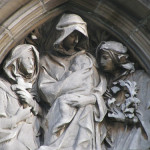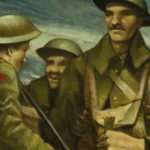We run our website the way we wished the whole internet worked: we provide high quality original content with no ads. We are funded solely by your direct support. Please consider supporting this project.

Jesus’ Different Kind of Nation
God called Abraham to form a unique nation by which “all peoples of the earth will be blessed.” The unique call of the descendants of Abraham was to become a nation of servant-priests whom God would use to reunite the nations of the world under his loving Lordship.
The vision of a reunited humanity is hammered home with increasing clarity and strength throughout the OT. Jeremiah looks forward to the time when “all nations will gather in Jerusalem to honor the name of the Lord.” Zechariah prophesies of a time when the Lord will “be king over the whole earth” so that he will be the only Lord confessed among the nations. And Joel prophesies of a time when God’s Spirit would be poured out “on all people.”
In Isaiah 55 the Lord announces that anyone from any nation who is thirsty or hungry can come and feast at his banquet table for free. He promises everyone who comes to his feast that he will bring them into the “everlasting covenant” that he “promised to David.”
In that same chapter, the Lord makes his global goal clear when he states how his chosen people will “summon nations you know not, and nations you do not know will come running to you” because the Lord has endowed you with splendor. God’s goal was to bless Israel as a means of attracting all nations to himself.
This blessing through this different kind of nation comes as other nations are united under a divinely appointed king. In Psalm 72, we read how the author prayed for a day when “all kings” and “all nations” will bow down” to a king whom God will anoint. When this happens “all nations will be blessed through [God’s anointed king]” and “the whole earth” will “be filled with his glory.”
Through this king all the tribes and nations will be reconciled as they come to know the one true God. Through him God’s dream of a united human community reflecting his triune love will be finally realized.
When the New Testament announces that Jesus is the “Christ,” it is an announcement that he is the anointed one, as Christ means “anointed.” The NT also refers to Jesus as the Lord, not just of the Jews, but of all people. In him, all the prophecies about the nations being reunited will eventually find their fulfillment.
Most of the Jews of Jesus’ day were intensely nationalistic and were expecting a completely pro-Israel Messiah. They though the Messiah would lead Israel to victory over their Roman oppressors and would reestablish Israel as a sovereign nation under God. This is why people tried to force Jesus to act and speak to divisive political issues of the day. But he refused to weigh in on these debates.
Jesus would not let himself be co-opted by any nationalistic agenda—not even on behalf of God’s “chosen nation.” For the kingdom that Jesus came to establish is about fulfilling God’s dream of reuniting all the nations.
Jesus reveals that, where God reigns, national walls will be torn down and national distinctions rendered insignificant. “In Christ,” Paul says, “there is neither Jew nor Gentile.” In Christ “the dividing wall of hostility” has been abolished between groups of people and a “new humanity” has been created. A central aspect of this kingdom is manifesting the beauty of what it looks like for a people to be freed from defining one nation against other nations and to be reunited under the God who is Lord of all nations. Jesus is a different kind of king establishing a different kind of nation.
—Adapted from The Myth of a Christian Religion, pages 78-81
Image by Marcia Erickson
Category: General
Tags: Blessing, Israel, Jesus, Kingdom of God, Nationalism, New Humanity
Topics: Ethical, Cultural and Political Issues
Related Reading

The Missing Jesus
Jonathan Martin wrote this compelling blog on the missing Jesus last month. It’s a thoughtful reflection on how easy it is to put Jesus in a box that conforms to our political, religious or social agenda. But the real Jesus is not an idea; he’s a person. And he’s a person who is constantly breaking…

The Cross in the Manger, Part 2
While some shepherds were tending their flock, an angel appeared to them announcing “good news that will cause great joy for all the people,” for it news about “a Savior…the Messiah, the Lord” (Lk 2:10-11). Most Jews of this time expected a Messiah who would save them by vanquishing their Roman oppressors and liberating Israel…

God’s “Ways” and “Thoughts” are Higher
Isaiah 55:8-9 is one of the more often quoted passages in the Bible. It reads: … my thoughts are not your thoughts, neither are your ways my ways … As the heavens are higher than the earth, so are my ways higher than your ways and my thoughts than your thoughts (vss. 8-9). This…

What Jesus Revealed About Being Human
According to the creation story, when Adam and Eve ate the fruit, they essentially ceased being the wonderful, God-centered, God-dependent human beings the Creator intended them to be. They became less than fully human. Instead, they began using everything and everyone in the world as surrogate gods, trying to get from people, deeds, and things…

Don’t Be a Functional Atheist at Christmas
All of us raised in Western culture have been strongly conditioned by what is called a secular worldview. The word secular comes from the Latin saeculum, meaning “the present world.” A secular worldview, therefore, is one that focuses on the present physical world and ignores or rejects the spiritual realm. To the extent that one…

Does Romans 13 Condone Government Violence? (podcast)
Greg deconstructs problematic interpretations of Romans 13. Episode 649 http://traffic.libsyn.com/askgregboyd/Episode_0649.mp3
